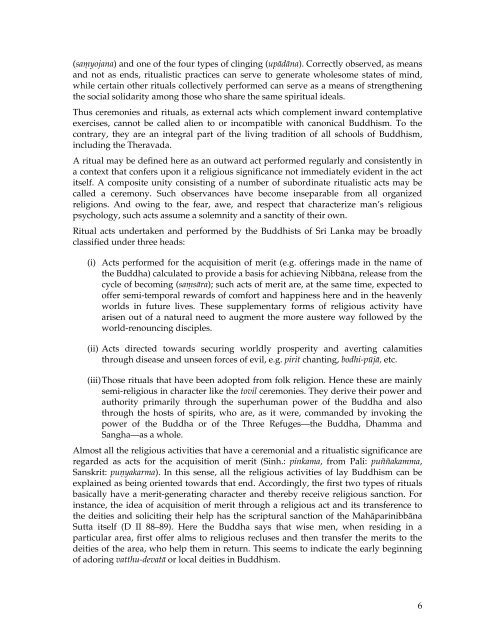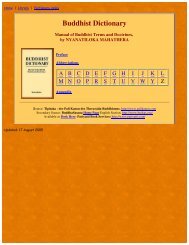Buddhist Ceremonies and Rituals of Sri Lanka
Buddhist Ceremonies and Rituals of Sri Lanka
Buddhist Ceremonies and Rituals of Sri Lanka
You also want an ePaper? Increase the reach of your titles
YUMPU automatically turns print PDFs into web optimized ePapers that Google loves.
(saíyojana) <strong>and</strong> one <strong>of</strong> the four types <strong>of</strong> clinging (upádána). Correctly observed, as means<br />
<strong>and</strong> not as ends, ritualistic practices can serve to generate wholesome states <strong>of</strong> mind,<br />
while certain other rituals collectively performed can serve as a means <strong>of</strong> strengthening<br />
the social solidarity among those who share the same spiritual ideals.<br />
Thus ceremonies <strong>and</strong> rituals, as external acts which complement inward contemplative<br />
exercises, cannot be called alien to or incompatible with canonical Buddhism. To the<br />
contrary, they are an integral part <strong>of</strong> the living tradition <strong>of</strong> all schools <strong>of</strong> Buddhism,<br />
including the Theravada.<br />
A ritual may be defined here as an outward act performed regularly <strong>and</strong> consistently in<br />
a context that confers upon it a religious significance not immediately evident in the act<br />
itself. A composite unity consisting <strong>of</strong> a number <strong>of</strong> subordinate ritualistic acts may be<br />
called a ceremony. Such observances have become inseparable from all organized<br />
religions. And owing to the fear, awe, <strong>and</strong> respect that characterize man’s religious<br />
psychology, such acts assume a solemnity <strong>and</strong> a sanctity <strong>of</strong> their own.<br />
Ritual acts undertaken <strong>and</strong> performed by the <strong>Buddhist</strong>s <strong>of</strong> <strong>Sri</strong> <strong>Lanka</strong> may be broadly<br />
classified under three heads:<br />
(i) Acts performed for the acquisition <strong>of</strong> merit (e.g. <strong>of</strong>ferings made in the name <strong>of</strong><br />
the Buddha) calculated to provide a basis for achieving Nibbána, release from the<br />
cycle <strong>of</strong> becoming (saísára); such acts <strong>of</strong> merit are, at the same time, expected to<br />
<strong>of</strong>fer semi-temporal rewards <strong>of</strong> comfort <strong>and</strong> happiness here <strong>and</strong> in the heavenly<br />
worlds in future lives. These supplementary forms <strong>of</strong> religious activity have<br />
arisen out <strong>of</strong> a natural need to augment the more austere way followed by the<br />
world-renouncing disciples.<br />
(ii) Acts directed towards securing worldly prosperity <strong>and</strong> averting calamities<br />
through disease <strong>and</strong> unseen forces <strong>of</strong> evil, e.g. pirit chanting, bodhi-pújá, etc.<br />
(iii) Those rituals that have been adopted from folk religion. Hence these are mainly<br />
semi-religious in character like the tovil ceremonies. They derive their power <strong>and</strong><br />
authority primarily through the superhuman power <strong>of</strong> the Buddha <strong>and</strong> also<br />
through the hosts <strong>of</strong> spirits, who are, as it were, comm<strong>and</strong>ed by invoking the<br />
power <strong>of</strong> the Buddha or <strong>of</strong> the Three Refuges—the Buddha, Dhamma <strong>and</strong><br />
Sangha—as a whole.<br />
Almost all the religious activities that have a ceremonial <strong>and</strong> a ritualistic significance are<br />
regarded as acts for the acquisition <strong>of</strong> merit (Sinh.: pinkama, from Pali: puññakamma,<br />
Sanskrit: puóyakarma). In this sense, all the religious activities <strong>of</strong> lay Buddhism can be<br />
explained as being oriented towards that end. Accordingly, the first two types <strong>of</strong> rituals<br />
basically have a merit-generating character <strong>and</strong> thereby receive religious sanction. For<br />
instance, the idea <strong>of</strong> acquisition <strong>of</strong> merit through a religious act <strong>and</strong> its transference to<br />
the deities <strong>and</strong> soliciting their help has the scriptural sanction <strong>of</strong> the Maháparinibbána<br />
Sutta itself (D II 88–89). Here the Buddha says that wise men, when residing in a<br />
particular area, first <strong>of</strong>fer alms to religious recluses <strong>and</strong> then transfer the merits to the<br />
deities <strong>of</strong> the area, who help them in return. This seems to indicate the early beginning<br />
<strong>of</strong> adoring vatthu-devatá or local deities in Buddhism.<br />
6

















